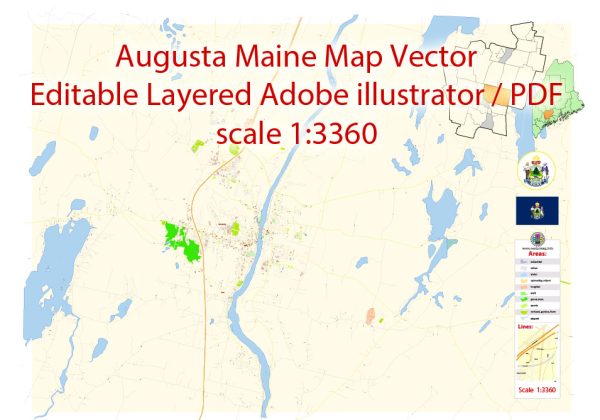Augusta, Maine, is the capital city of the state and is known for its rich history and urban development. Its development is closely tied to the broader history of the state of Maine and the United States. Here’s an overview of Augusta’s urban development throughout history:
- Early Settlement and Incorporation: Augusta was settled in the early 17th century and was originally part of the Plymouth Colony. It was incorporated as a town in 1797 and later became the capital of Maine in 1827 when Maine achieved statehood.
- Transportation and Industry: The growth of Augusta was influenced by its location along the Kennebec River. During the 19th century, the city thrived as a center for shipping and trade, thanks to the river’s navigable waters. This led to the development of various industries, including shipbuilding, lumber mills, and textile factories.
- State Government and Infrastructure: Augusta’s status as the state capital led to the construction of government buildings, including the Maine State House, which was built in 1832 and remains a prominent symbol of the city. The presence of state government jobs and services contributed to the city’s economic stability.
- Urban Expansion: As Augusta grew, its urban area expanded. Residential neighborhoods, commercial districts, and industrial areas developed in the city, with a focus on serving the needs of both the local population and the state government.
- 20th Century Development: In the 20th century, Augusta continued to grow, with developments in education, healthcare, and commerce. The city became home to various cultural institutions, including museums and theaters. Expansion of the transportation network, including roads and the Augusta State Airport, played a significant role in the city’s development.
- Economic Shifts: Augusta, like many industrial cities, experienced economic shifts as traditional industries declined. Some of the older factories and mills closed, leading to the diversification of the local economy. Health care, education, and government-related employment became increasingly important.
- Preservation and Revitalization: Augusta has made efforts to preserve its historic character. The city has revitalized its downtown area and waterfront, promoting tourism and cultural events. Historic preservation projects have been undertaken to maintain the charm of older buildings.
- Modern Augusta: In the 21st century, Augusta continues to serve as the political and administrative center of Maine. The city’s economy has evolved, with a focus on healthcare, government, education, and services. Augusta offers a mix of historical sites and modern amenities, making it a unique and dynamic place to live and visit.
Augusta, Maine’s urban development reflects the broader historical trends of industrialization, government growth, and economic diversification. The city’s history is deeply intertwined with the history of Maine as a whole, and its continued development reflects the changing needs and opportunities of the modern era.


 Author: Kirill Shrayber, Ph.D. FRGS
Author: Kirill Shrayber, Ph.D. FRGS